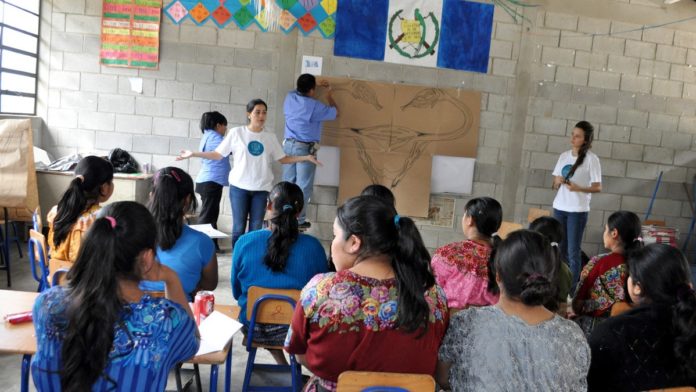Tampons that change the world, one period at a time

“Welcome to the store for vaginas.”
These are the confident and unapologetic words that greet you when you visit the website for SHEVA, a startup that sells feminine hygiene products for a cause. The branding, which includes a woman in a classic Rosie the Riveter pose holding a box of Playtex tampons, dispels menstrual stigma and promotes women’s empowerment with every click.
But this isn’t just a one-stop shop for women’s products. SHEVA is also a community working to empower girls in developing countries. With every purchase, the company gives a month’s supply of sanitary pads to a girl in need, and works to educate her about her body and her rights.
“I believe girls are the most powerful forces in changing a community,” Marisabel Ruiz, CEO and founder of SHEVA, tells Mashable. “But a lot of girls in developing countries do not have access to basic sanitary protection. Every time they have their periods, they miss school or don’t go to work. Every month, it’s like their lives stop.“
As a result, many girls get low grades, drop out of school or get pregnant at very young ages.
Taboos and a lack of understanding surrounding periods continue to permeate cultures, too. According a 2012 WaterAid survey, 48% of girls in Iran and 10% of girls in India thought menstruation was a disease. UNICEF found that 66% of girls in South Asia didn’t know anything about menstruation before their first period.
In certain cultures, such as parts of Nepal and Bangladesh, menstruating women are isolated, which hinders their general hygiene and access to education.
“My mission is to help these girls succeed by giving them the tools and information they need to continue their education, and continue their lives,” Ruiz says.

Image: SHEVA
Women (currently only in the U.S.) can go to SHEVA.com and find the most popular brands of feminine care products they need, from pantyliners and feminine wash to condoms, lubricants and pregnancy tests. They’re the same items you would buy at a regular pharmacy or supermarket, with the added convenience of shopping online, and the added social impact of changing the lives of underprivileged girls.
Since SHEVA launched in October 2014, the company’s 15 employees have focused on girls in Guatemala, where Ruiz was born and raised. She already had the contacts and resources, so starting there allowed them to more easily see how the model works before expanding elsewhere.
“My goal is to empower one million girls in Guatemala by 2025,” she says.
After studying business administration in Spain and Hong Kong, Ruiz was inspired by business models such as TOMS, Honest Company and Warby Parker. These companies made her realize that you can start a social enterprise in any industry, and with any product or service.
But SHEVA deviates from companies like TOMS — whose one-for-one model has been long been criticized for failing to address the underlying issue of poverty — by fully acknowledging that the month’s supply of sanitary pads is only the first step toward real change. SHEVA partners with various local NGOs, such as the anti-poverty organization Asopuente and Congregación Marta y Maria, a girls’ home in Jalapa, to establish a two-year education program that explains what menstruation is, the basics of personal hygiene, the importance of self-esteem and identity, and more.
SHEVA will stay with these partner programs throughout the education process, and is currently tracking things like attendance and that the girls have continued access to sanitary pads.
The company’s also trying to set up a secondary model in which the girls can learn to produce pads on their own, working with local university health centers to make safe, biodegradable pads with local, accessible materials like banana fibers. Once the girls learn how to do this, it would increase access and self-sufficiency, even allowing them to create their own businesses.
So far, the biggest impact Ruiz has seen is an increase in knowledge and a change in attitude. Girls who didn’t know what menstruation was now understand what is going on with their bodies, and they’re less shy to ask questions. They’re going back to school, opening their own bank accounts and waiting to get married until they’re older.

Girls in Chimaltenango, Guatemala learn about the female reproductive system.
Image: Desi Bauer/SHEVA
And SHEVA is growing. Not only is it raising money through its own site, but a number of companies expressed early interest in the startup and have partnered with it to sell “SHEVA products,” giving a percentage of the proceeds to the cause.
So what’s next? Ruiz would love to see SHEVA go global, especially in Europe and Asia, where social enterprise is just now starting to thrive. Additionally, there are plans to set up an online forum and Q&A portal for girls and women to log in and ask any questions they have at any time.
In the meantime, the company is trying to show women and girls in both the developing and developed worlds that menstruation is nothing to be ashamed of, and neither is the word “vagina.”
“It’s a super powerful thing as a woman,” Ruiz says.
Have something to add to this story? Share it in the comments.
